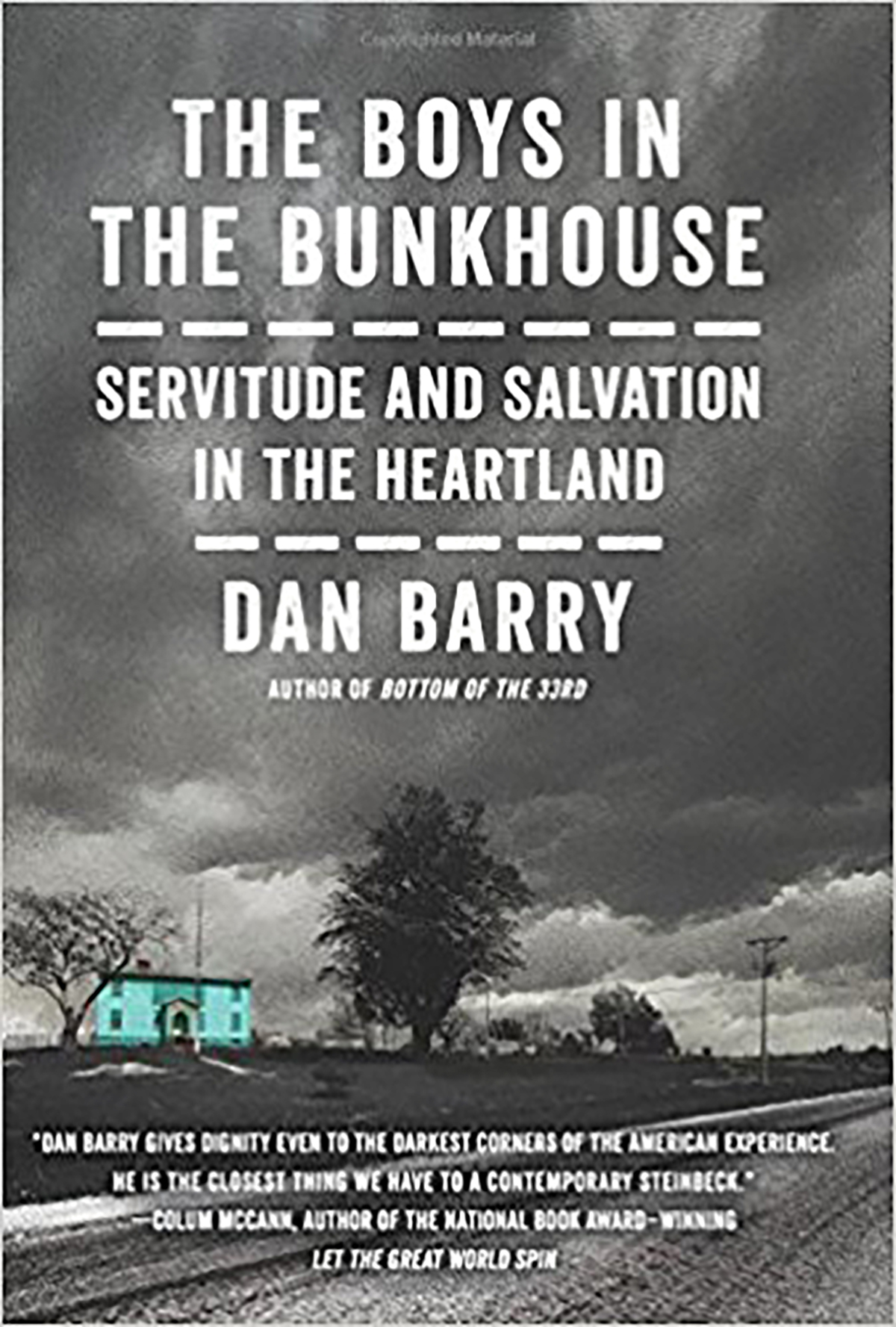Journalist Dan Barry has been wandering the United States for years.
It’s a job requirement, in a way. For his column “This Land” in The New York Times, Barry travels around the country to explore what the newspaper calls its “obscure and well-known corners.” Since starting the column in 2007, Barry has interviewed people from Patsy Cline’s hometown about her musical legacy, ranchers along the Mexican border and residents of Eleanor, West Virginia, a town named after First Lady Eleanor Roosevelt.
As he looks for stories, Barry said, he has a way of assessing what makes a tale worth telling.
“One of the measures I have for whether a story is worth it is whether my curiosity is spiked and whether my emotions are spiked — rage, or surprise, or me asking, ‘What the hell is this about?’ ” Barry said.

He said all of those things happened when he stumbled across a brief news item in 2013 about a lawsuit in Iowa — a piece about 100 words long that would become the center of his book The Boys in the Bunkhouse: Servitude and Salvation in the Heartland.
Barry’s book is the Chautauqua Literary and Scientific Circle selection for Week Eight, and he’ll present his work at 3:30 p.m. Thursday in the Hall of Philosophy for the CLSC Roundtable.
That brief news item contained certain phrases and details that blew Barry away, he said: “32 men with intellectual disabilities living in an old schoolhouse, working at a turkey plant and eviscerating poultry, being paid $65 a month for 30-odd years.”
“It was extraordinary to me, and I wanted to write more about it,” Barry said.
His investigation led to a long piece for The New York Times, but Barry said he still felt there was more to tell, so he “tricked a publisher into publishing a book about it.”
“The deeper and deeper I got into it, and the more and more I got to know the men themselves and what they’d gone through, the more I wanted to tell more of an epic about their lives and the exploitation they’d experienced,” Barry said.
///
The group of men Barry writes about lived and worked in Atalissa, Iowa, and while the people in town were accepting of them, they also infantilized them in a way.
To the people of Atalissa, they were affectionately known as “the boys.”
Barry saw them — and refers to them — as men.
“They’re men,” Barry said. “A guy is 38 years old, whether he has disabilities or not. He’s told he can’t watch TV because he didn’t work hard enough at the plant — that’s absurd. But that speaks to the infantilization of these men. It speaks to how we condescend, whether we do it consciously or subconsciously, to people with disabilities. We condescend, or we dismiss. That’s got to freaking stop.”
Part of making that stop was focusing the narrative of The Boys in the Bunkhouse on these men, not just the people who helped them. Barry said the men deserved to be at the center of their story, not at the fringes.
When Barry began the process of tracking his subjects down, he got in touch with the lawyer who had represented the men in their lawsuit. Barry told the lawyer that he wanted to talk to the men — he didn’t want to write around them.
The lawyer told Barry that no one had talked to the men. When Barry asked why, the answer he received took him aback, he said.
No one had asked, the lawyer told him.
“As I thought about that exchange, it seemed to reflect the continuing segregation in society between ‘non-disabled’ people and people with disabilities,” Barry said. “That only furthered my resolve to make sure that — as much as possible — that the men were involved in the story.”

As he got to know his subjects and began figuring out how to tell their story, Barry said he realized he had an opportunity to give voice to people who tend to fly under the radar.
“These are men with intellectual disabilities, they’re in the middle of nowhere in Iowa,” Barry said. “Who really gives a damn what happens in a turkey plant in Iowa? Who really thinks about where their turkey comes from, where their food and their meat comes from?”
Barry said in an era where journalism is focused on “punditry and glib comments,” his mission is to write stories that help the reader “take a few minutes, enter this world, feel how these people feel, experience what they experience, and from that, you’ll be more empathetic, more aware of what it’s like in worlds that are not your own.”
He simply wants to tell a story — and to get people to give a damn. Sometimes that means he has to “take people by the scruff of the neck” and put them into situations unfamiliar to them, Barry said.
It also means in-depth reporting, Barry said, something he relies on as both a writer and a reader. Barry was part of the staff at the Providence Journal-Bulletin that won a Pulitzer Prize for Investigative Reporting in 1994 for uncovering corruption in Rhode Island’s court system.
“That’s what sustains us,” Barry said. “And that’s what informs us.”
Going in-depth with his reporting was part of what he found most gratifying about writing The Boys in the Bunkhouse, Barry said. It allowed him to be the conduit for the men and their experiences.
“Giving voice to these men and trying to send the message that these men matter, that these men belong among us, and that what happened to these men should not happen in this society — I find that rewarding,” Barry said.
///
As she looked for a book to fit Week Eight’s theme of “Media and the News: Ethics in the Digital Age,” Sherra Babcock, vice president and Emily and Richard Smucker Chair for Education, said she wanted to stay away from books that were simply about the media. She said she was looking for a compelling story.
She found that in Barry’s book, she said, which emphasizes the power of the media and the way in which it can give a platform to those who might not otherwise have one. Babcock said she knew The Boys in the Bunkhouse was about a reporter who uncovered a little-known story and brought major attention to it.
Reporter’s Notebook
The Chautauqua Literary and Scientific Circle Historic Book List features hundreds of selections, some of which present themes similar to 2017 CLSC selections.
If you liked The Boys in the Bunkhouse, you might also like…
• A Mind at a Time by Mel Levine (2002-2003)
• Strangers Drowning: Grappling with Impossible Idealism, Drastic Choices, and the Overpowering Urge to Help by Larissa MacFarquhar (2016-2017)
Finally, three extra recommendations from the reporter:
• The Book of Ruth by Jane Hamilton
• Of Mice and Men by John Steinbeck
• Men We Reaped by Jesmyn Ward
“It turns out that that is a very tiny, tiny part of the story, but it’s an important part of the story because this situation would have never been known without it,” Babcock said.
The book also has an advocate in President Michael E. Hill, who met Barry when he was an 18-year-old student at St. Bonaventure University. Barry is also an alumnus of St. Bonaventure.
Hill said he’s long admired Barry’s journalistic work, largely because Barry looks for the story that isn’t being told — and tells it.
“And he tells it in such vivid detail that it compels you to act,” Hill said.
The Boys in the Bunkhouse gives voice to a population that often gets overlooked, Hill said: people with disabilities.
“We passed the Americans with Disabilities Act (in 1990), and I think so much of society thinks, ‘OK, we’re done,’ ” Hill said. “And the hurdles and barriers and obstacles — emotional, psychological, physical, cultural — for people with disabilities are still far too great. I think this book really elevates these issues in a way so we can talk about them again, and I’m really excited by that.”
Barry said he hopes his book will get people to discuss these issues and get them to think about inclusion. People with intellectual disabilities have often been left outside of communities, he said.
“They’ve been pushed aside because people with intellectual disabilities make us uncomfortable — this is historic,” Barry said. “And what is that about? I don’t know what that’s about.”
That was part of his learning process while writing The Boys in the Bunkhouse, Barry said. He had to reckon with his own experiences with people who had intellectual disabilities and reflect on how he interacted with them.
Barry said he doesn’t want to hold himself as any type of model, but that getting to know the men in the bunkhouse and writing about them was illuminating for him. It’s something he hopes he can make clear for his readers as well: These men are people just like them.
“They should think about people with intellectual disabilities as fully realized, flesh-and-blood human beings with the same desires and urges as anyone else,” Barry said. “They are not stereotypes, they’re not two-dimensional and they belong among us.”
Recognizing that shared humanity helps people be better, Barry said.
That includes Barry, too.
“We’re all flawed, incomplete people striving toward something, and I’m among them,” Barry said. “And I think the book helped me think about that. We all like to imagine the world as good and evil, black and white. But we all inhabit the muddled gray between good and bad, black and white, however you want to frame that. And we’re striving to be better.”
Fellow wanderer and journalist Gloria Steinem wrote in her memoir My Life on the Road that her years of traveling have taught her that “If everyone has a full circle of human qualities to complete, then progress lies in the direction we haven’t been.”
Barry said he likes that idea.




